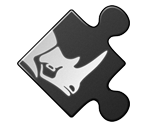Curve Bounding Box
Demonstrates how to create a curve bounding box (world and plane oriented).
partial class Examples
{
public static Rhino.Commands.Result CurveBoundingBox(Rhino.RhinoDoc doc)
{
// Select a curve object
Rhino.DocObjects.ObjRef rhObject;
var rc = Rhino.Input.RhinoGet.GetOneObject("Select curve", false, Rhino.DocObjects.ObjectType.Curve, out rhObject);
if (rc != Rhino.Commands.Result.Success)
return rc;
// Validate selection
var curve = rhObject.Curve();
if (curve == null)
return Rhino.Commands.Result.Failure;
// Get the active view's construction plane
var view = doc.Views.ActiveView;
if (view == null)
return Rhino.Commands.Result.Failure;
var plane = view.ActiveViewport.ConstructionPlane();
// Compute the tight bounding box of the curve in world coordinates
var bbox = curve.GetBoundingBox(true);
if (!bbox.IsValid)
return Rhino.Commands.Result.Failure;
// Print the min and max box coordinates in world coordinates
Rhino.RhinoApp.WriteLine("World min: {0}", bbox.Min);
Rhino.RhinoApp.WriteLine("World max: {0}", bbox.Max);
// Compute the tight bounding box of the curve based on the
// active view's construction plane
bbox = curve.GetBoundingBox(plane);
// Print the min and max box coordinates in cplane coordinates
Rhino.RhinoApp.WriteLine("CPlane min: {0}", bbox.Min);
Rhino.RhinoApp.WriteLine("CPlane max: {0}", bbox.Max);
return Rhino.Commands.Result.Success;
}
}
Partial Friend Class Examples
Public Shared Function CurveBoundingBox(ByVal doc As Rhino.RhinoDoc) As Rhino.Commands.Result
' Select a curve object
Dim rhObject As Rhino.DocObjects.ObjRef = Nothing
Dim rc = Rhino.Input.RhinoGet.GetOneObject("Select curve", False, Rhino.DocObjects.ObjectType.Curve, rhObject)
If rc IsNot Rhino.Commands.Result.Success Then
Return rc
End If
' Validate selection
Dim curve = rhObject.Curve()
If curve Is Nothing Then
Return Rhino.Commands.Result.Failure
End If
' Get the active view's construction plane
Dim view = doc.Views.ActiveView
If view Is Nothing Then
Return Rhino.Commands.Result.Failure
End If
Dim plane = view.ActiveViewport.ConstructionPlane()
' Compute the tight bounding box of the curve in world coordinates
Dim bbox = curve.GetBoundingBox(True)
If Not bbox.IsValid Then
Return Rhino.Commands.Result.Failure
End If
' Print the min and max box coordinates in world coordinates
Rhino.RhinoApp.WriteLine("World min: {0}", bbox.Min)
Rhino.RhinoApp.WriteLine("World max: {0}", bbox.Max)
' Compute the tight bounding box of the curve based on the
' active view's construction plane
bbox = curve.GetBoundingBox(plane)
' Print the min and max box coordinates in cplane coordinates
Rhino.RhinoApp.WriteLine("CPlane min: {0}", bbox.Min)
Rhino.RhinoApp.WriteLine("CPlane max: {0}", bbox.Max)
Return Rhino.Commands.Result.Success
End Function
End Class
import Rhino
import scriptcontext
def CurveBoundingBox():
# Select a curve object
rc, rhobject = Rhino.Input.RhinoGet.GetOneObject("Select curve", False, Rhino.DocObjects.ObjectType.Curve)
if rc!=Rhino.Commands.Result.Success: return
# Validate selection
curve = rhobject.Curve()
if not curve: return
## Get the active view's construction plane
view = scriptcontext.doc.Views.ActiveView
if not view: return
plane = view.ActiveViewport.ConstructionPlane()
# Compute the tight bounding box of the curve in world coordinates
bbox = curve.GetBoundingBox(True)
if not bbox.IsValid: return
# Print the min and max box coordinates in world coordinates
print "World min:", bbox.Min
print "World max:", bbox.Max
# Compute the tight bounding box of the curve based on the
# active view's construction plane
bbox = curve.GetBoundingBox(plane)
# Print the min and max box coordinates in cplane coordinates
print "CPlane min:", bbox.Min
print "CPlane max:", bbox.Max
if __name__=="__main__":
CurveBoundingBox()

